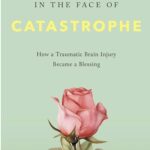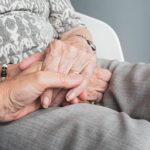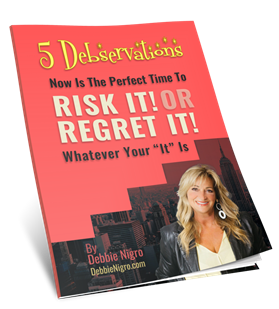On this week’s Keeping the “Live” in Alive segment of The Debbie Nigro Show, I was joined by my longtime gal pal (though we’ve never actually met in person!) Linda Arroz, who’s on an inspiring new mission in Tulsa, Oklahoma.

Linda is helping raise funds for a short social impact film called Awakening Georgie — a powerful narrative about the hidden struggles of traumatic brain injury (TBI) survivors and the miracles that can come from compassion.
“Thirty percent of injury-related deaths in the U.S. are caused by a traumatic brain injury. That’s a lot. We need to talk about this,” Linda shared passionately.
The project is backed by Emmy Award-winning director Jerry Scherer and filmmaker Akiva Penaloza, and it sheds light on a journey many families face but few openly discuss. To make it happen, they’ve teamed up with CauseMatch, a platform that pairs creators with nonprofits so fundraising becomes not just doable, but also tax-deductible for donors.

Linda also spotlighted another story of resilience — the book In the Face of Catastrophe, written by Jennifer Rose Goldman and her mother, after Jennifer suffered a sudden brain bleed just before her 31st birthday. Against all odds, she’s fighting her way back, one determined step at a time.
Our conversation kept circling back to one big word: compassion.

As I like to remind everyone when life feels overwhelming: “Get in, get through, and get onward.”
And with Linda’s work, that message feels more important than ever.
Please listen to this short podcast of my live conversation with Linda Arroz on The Debbie Nigro Show. If you can help Linda with her cause – please do. If you’d rather read than listen the transcript of the audio is below.
AUDIO TRANSCRIPT :
And now back to The Debbie Nigro Show.
0:00:18
(Speaker 2)
All right, we’re back in action on the Debbie Nigro show. It’s the one day a week where I focus on keeping us all alive, keeping the living alive and, you know, showcasing people and stories that I have passion about getting the word out about. So without further ado, I’m going to introduce you to a gal pal who’s currently in Tulsa, Oklahoma. She’ll tell you why she’s there. Linda Arroz is her name.
0:00:43
(Speaker 2)
And she’s raising funds to produce a documentary about the hidden struggles of traumatic brain injury survivors and the miracles that can come from compassion. Hello, Linda.
0:00:55
(Speaker 1)
So great to be back and hear your voice.
0:00:58
(Speaker 2)
Linda, I have to ask you a stupid question.
0:01:02
(Speaker 4)
You ready? Okay.
0:01:05
(Speaker 2)
How the heck do we know each other? It’s all these years we go back and forth. I know I love you. You love me. You try and help me. I try and help you.
0:01:12
(Speaker 3)
I love you more.
0:01:12
(Speaker 6)
We just clicked.
0:01:13
(Speaker 2)
But how do we meet each other? Do we ever meet?
0:01:16
(Speaker 1)
No, we’ve never met in person, but we shared a client several years ago, a weight loss clinic in Westchester.
0:01:25
(Speaker 2)
Oh, right. That’s how it happened. Got it.
0:01:27
(Speaker 5)
Yeah.
0:01:27
(Speaker 9)
Mitch.
0:01:28
(Speaker 8)
Yeah.
0:01:29
(Speaker 2)
He was great.
0:01:30
(Speaker 7)
He was great.
0:01:31
(Speaker 2)
Yeah. So good to have you. You moved to Tulsa.
0:01:36
(Speaker 1)
Explain why. Well, in quick strokes, Tulsa Remote is a program, the brainchild of a billionaire named George Kaiser. He thought Tulsa was experiencing a brain drain, and he wanted to attract business and have a strong workforce and create a tech and innovation hub. And so for several years, he’s funded this program, and they pay a stipend incentive of $10 ,000 to move here for one year and participate in the community. They introduce you to movers and shakers and business leaders and connect you with advisors and there’s over a million dollars worth of services, subscriptions, platforms, if you’ve got a tech startup and He stopped the brain drain and Tulsa now has one of the largest tech and innovation hubs in the country.
0:02:29
(Speaker 1)
And I’m telling you, it’s got the vibe of Silicon Valley in the late 90s. This is there’s a lot of opportunity here for people who are looking to get something going, buy an affordable house or have that next adventure.
0:02:42
(Speaker 2)
And that’s where I’m having my next adventure because Tulsa has the third largest concentration of Art Deco buildings from the oil boom, and it’s the 100th anniversary of the Art Deco design movement. I was always drawn to Art Deco. I always loved it. The first time I ever saw it in motion in architecture was when I had gone to Miami Beach with my family as a child on a vacation. I was just so enamored with the buildings. I always liked the font and I just liked the whole thing.
0:03:16
(Speaker 1)
That must be a cool place.
0:03:18
(Speaker 6)
Well, come visit me.
0:03:20
(Speaker 1)
Okay. I’ll take you on a Tulsa tour. The underground tunnels.
0:03:25
(Speaker 2)
There’s a lot going on. Yeah, that’s great.
0:03:28
(Speaker 1)
So you decided to put your energy into producing a documentary, is that correct? Well, it’s actually a short social impact film, which is narrative, but it gets the point across about traumatic brain injury, which was something that I was It wasn’t really on my radar. A few years ago, a lovely friend of mine, Jerry Scherer, who’s an Emmy award -winning director, did her documentaries called Quiet And it explores the trauma and drama of people who incur brain injuries, particularly veterans or sports athletes. And so she’s got all the latest information on that. But as a former magazine editor, when you hear something like, oh, ha ha, that’s interesting, then you see it again.
0:04:19
(Speaker 1)
But the third time around, you realize that something is really important. And that’s what’s happened to me. A very good colleague of mine, Akiva Penaloza, who is an AFI American Film Institute grad and colleague of Jerry’s. We’re in Greenlight Women. So we’re supporting each other’s endeavors. And Akiva asked me to come on board.
0:04:41
(Speaker 1)
to help raise funds to tell this story about a family member of hers. And when Akiva told me what the families go through in addition to the individual who’s suffering, it really chilled me because Debbie’s 30 % of injury -related deaths in the U .
0:05:01
(Speaker 3)
0:05:02
(Speaker 1)
are caused by a TBI, a traumatic brain injury. That’s a lot. And I was like, okay, let’s talk about this. So what’s interesting about this particular project, Debbie, and thank you so much for letting me share. You’re welcome. very creative way to raise money for it and to fund it, because all creators out there know, all storytellers know, you’ve got a great idea, but then you want to make a movie, you want to make a TV show, you want to write a book about it, and it’s a very daunting task and it costs a lot of money.
0:05:33
(Speaker 1)
So we teamed up with an organization called CauseMatch. And they work very clever platform and they streamline it. It’s totally turnkey. They set the whole thing up on the back end so that you’re paired with a nonprofit and the money that you raise becomes a tax -deductible donation for anyone who’s kind enough to participate in your fundraising. So we’re really excited to be working with CauseMatch for Awakening Georgie, which is the name of the social impact film.
0:06:05
(Speaker 1)
And social impact means that you’re trying to make a difference, that you’re telling a story, but it also has real value. It has something, an important message in it. And that brings me to this other project. Here is the triumvirate, the third one. Through relationships, I met Jennifer Rose Goldman and her mother, Karen Hershleifer, and they live on Long Island. And Jennifer, just before her 31st birthday and perfect health, fell on the floor with a brain bleed.
0:06:39
(Speaker 1)
And so the shocking journey of a very strong, competent founder, she had her own business, fell by this brain injury.
0:06:50
(Speaker 2)
And the five years that’s taken her to get to a place where she still uses a walker, still uses braces, but is back at work. She and her mother wrote a compelling book about their journey called In the Face of Catastrophe. That is a catastrophe. There are so many catastrophes every day.
0:07:08
(Speaker 1)
It’s hard to keep up with them all. It’s so exhausting to to try and process everybody’s challenges around the world every day, you know, Linda.
0:07:15
(Speaker 2)
So I know you’re just extracting one little category of catastrophe and showing through storytelling stories of resilience and hope so other people maybe could get exactly it because these are very challenging times and any story that we can share that shows as you said hope and that the journey is part of the process but you know sometimes the only way out is through it and so by sharing other people’s experiences, we can provide a template for how to just keep going every day. Yeah, I used to fight, you know, the urge to quit when you don’t want to quit. I’ve been through some stuff myself and I came up with a slogan that I use to get me through and I say to everybody else, get in, get through, and get onward. Get in, get through, and get onward, whatever that means. At least you know there’s an onward somehow psychologically.
0:08:11
(Speaker 2)
You know there’s an out, hopefully, and it’s not the case for everybody, but for many it is with the right, you know, medical help and compassion, if you will, right? Compassion is a big word, compassion. Boy, compassion really matters.
0:08:26
(Speaker 1)
You’d be surprised how many people put stuff on social media, and you’ve probably seen this yourself, Linda, a private story of torturous emotions or experiences that doesn’t belong, say, on a business platform or a social platform, but just to get it out there, to let people know what they’re going through, and then so appreciative when people take time to show compassion and caring. You’ve seen it a hundred times, right? I’ve seen it a thousand times, and the thing about that, in spite of the fact that it feels like too much information sometimes that frequently some people have nowhere to turn. And they don’t know, they don’t know that there are people out there who may not know us, may not know, have had this issue, but they care. They care a lot. And that’s why We want to get our stories out there so that other people a become more aware, but can can help it.
0:09:21
(Speaker 1)
Everybody can help in a different way.
0:09:23
(Speaker 2)
Not everybody can can donate money. Not everybody can be a producer, but people can volunteer and they can tell these stories to others. You know, I had a guy on my show not too long ago. He founded a company called Cherokee out of an experience he himself had where he had had a terrible physical debilitation and he was just struggling and lonely and had really nobody to talk to about it and then you know was able to talk to others going through the same thing and he’s like this really matters and it made me feel so much better that somebody else could relate and so he started this whole platform which is called Cheropee where people going through the same things can relate.
0:09:59
(Speaker 1)
You should meet him probably for this. Maybe there’s people in his work. I’ll look him up.
0:10:04
(Speaker 2)
You can send me the information.
0:10:05
(Speaker 1)
I’d love to.
0:10:06
(Speaker 2)
Yeah, because if somebody’s going through this…
0:10:08
(Speaker 5)
I love the catchy name.
0:10:09
(Speaker 1)
Yeah, Cherokee.
0:10:10
(Speaker 2)
That’s really smart. Easy to remember.
0:10:12
(Speaker 1)
Right. So we, you know, whatever it is, if somebody has a terrible illness like this or an unexpected catastrophe or a romantic disaster or whatever it is, you know, you need somebody to like, at some point, get it off your chest and have somebody care that what you’re saying to say something back to make you feel better or lead you. No, that’s true. And it helps sometimes if it isn’t a close friend or family member. Yeah, because they have a lot vested in you. And it may not be you may need more of an outside opinion or an objective, you know, an objective look.
0:10:47
(Speaker 1)
And I think that’s why, you know, why I’m I’m really hoping with Awakening Georgie when we get our short the short film out when we get on the festival circuit that we’ll be sharing, sharing this information. And I think a lot of people will be able to talk about their own experiences. And, you know, because a lot of people, I don’t think people realize that a simple what they call a concussion, which we take for granted because all kids playing football and so on and so forth get these things. But those are really damaging injury that can show up later in other ways. and affective decline. So, you know, there’s just so much we don’t know about the human body.
0:11:33
(Speaker 1)
And again, I think that the
0:11:35
(Speaker 2)
why these two projects I’m really proud to be a part of. are going to get more information out there. Yeah, I’m surprised any mother lets her kids play football these days. I’m not kidding.
0:11:46
(Speaker 1)
Like I’d be out there tackling the guy like get away from my kid. I’d be tackling. I’d probably sound ridiculous, but I just it looks like a bunch of grown men in pajamas with these big helmets on jumping on top of each other. And I’ve never understood why one tackle isn’t enough.
0:12:05
(Speaker 2)
Why do they all pile up on each other? And I know I’m going to get a lot of backlash. They didn’t get the memo because they’re doing other things that they were thinking about something else. Then they all like, oh, we’re all here. I didn’t get the memo. I always love football for one thing.
0:12:18
(Speaker 2)
I like throwing a spiral football.
0:12:19
(Speaker 1)
I could do it really good. I may be the first grandma to out spiral anybody who wants to take me on.
0:12:25
(Speaker 2)
Congratulations on that. I’m following some of your wonderful grandmother escapades on Facebook. Oh, yeah. I’m the working grandma on the run. And I don’t know why I had. You’re a public relations girl and a magazine girl by trade.
0:12:39
(Speaker 1)
Why would somebody like me take eight million pictures of everything I want to share and then never share it with anybody?
0:12:44
(Speaker 4)
What is the problem there, you think?
0:12:47
(Speaker 2)
It’s because you have the technology in your hand. Yeah. I take all the pictures and I’m like, I know, but I don’t share them. I’m like, ah, that, no, I’m not going to share that. That’s done now. But you know what I’m going to do?
0:12:58
(Speaker 2)
I’m going to start sharing a little more. I think I’m going to dump all the photos out of my phone and just put them out there in the world so I can clean my phone out. That’s what I’m going to do, but not Linda.
0:13:09
(Speaker 1)
I’m going to come see you in Tulsa.
0:13:12
(Speaker 2)
My gosh. So did I. So much appreciated. producing a short social impact film called Awakening Georgie based on the true story of a young woman who suffers a traumatic brain injury, how she looks after recovery, finds healing through an unexpected act of kindness, highlighting an inspiring book called In the Face of Catastrophe, and she’s shining a light on the hidden struggles of traumatic brain injury survivors and the miracles that can come from compassion. So thanks again.
0:13:46
(Speaker 3)
All the links are up, Linda.
0:13:47
(Speaker 2)
All the links are up, girl. All my love. Okay, have a great rest of your day. Back in a moment, one last segment on the Debbie Nigro Show.


